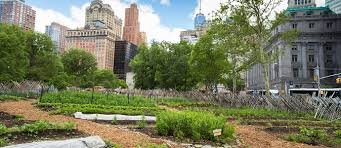the disadvantages associated with urban agriculture

Urban agriculture can offer many benefits, especially in terms of improved food security. However, as with any system, there are potential downsides which can reduce or even eliminate the potential benefits. Such issues are especially prevalent in developing lands and in areas affected by poverty where effective infrastructure, e.g. regulation, sanitation or education, has not yet been established or is in disarray.
Health Risks from Urban Agriculture
- The potential for disease transmission if proper food and environmental safety precautions are not in place
- Exposure to pesticides and herbicides
- Contamination from animal waste
- Urban soils may be contaminated and unsuitable for food production
Environmental Concerns in Urban Agriculture
- Soil, water, and air pollution from chemicals or animal waste
- Abuse of urban flora for grazing
- Erosion or flooding from riverside agriculture
Social Implications of Urban Agriculture
- Too much time may be spent managing crops, leading to a neglect of familial obligations
- The potential for child labor
- Further erosion of rural communities
Urban Management Challenges with Urban Agriculture
- Taxation is difficult
- Urban agriculture sites may occupy spaces that can command higher rents when used in other capacities
- Uses expensive or limited potable water
- Requires extra monitoring for food and environmental safety
Other Disadvantages of Urban Agriculture
- May not be aesthetically pleasing
- Improper land-use may result in accidents
Nonetheless, many of the above-mentioned issues can be addressed via education, infrastructure development, and intelligent foresight in an effort to create sustainable, inclusive urban agriculture systems that provide environmental, social, and economic benefits to local communities.

sources:
- Deelstra, T., & Girardet, H. (2000). Urban agriculture and sustainable cities. In: Bakker N., Dubbeling M., Gündel S., Sabel-Koshella U., de Zeeuw H. Growing cities, growing food. Urban agriculture on the policy agenda. Feldafing, Germany: Zentralstelle für Ernährung und Landwirtschaft (ZEL), 43-66.
- De Zeeuw, H., Van Veenhuizen, R., & Dubbeling, M. (2011). The role of urban agriculture in building resilient cities in developing countries. The Journal of Agricultural Science, 149(S1), 153-163.
- Draper, C. & Freedman, D. (2010). Review and Analysis of the Benefits, Purposes, and Motivations Associated with Community Gardening in the United States. Journal Of Community Practice, 18(4), 458-492.
- RUAF (n.d.) Urban Agriculture: what and why?
- Smit, J., Nasr, J., Ratta, N. (2001) Urban Agriculture: Yesterday and Today, in Urban Agriculture Food, Jobs and Sustainable Cities. The Urban Agricultural Network.
image credit





One Comment
Comments are closed.